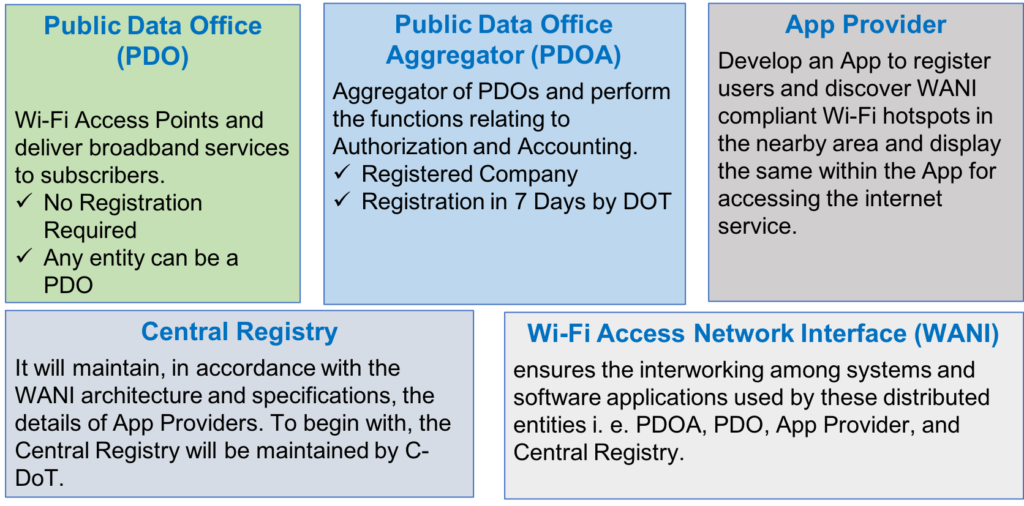Wi-Fi Access Network Interface (WANI) that was envisaged by TRAI Consultation papers has become a reality as Government approved it as PM WANI, on 9th December 2020, for exponential proliferation of public Wi-Fi networks.
PM WANI will make it possible millions of Wi-Fi hotspots to emerge across the country, giving easy access to internet to common man. New business models will emerge, making it possible to add another layer of Internet providers with access points being provided by corner shops and stores and others.
The Detailed Document about the Scheme can be downloaded and read at (Click to open) Department of Telecom Site.
The simplicity of the scheme is recognised by the very fact that DOT automatically recognised PDOA after application in 7 days.
PM WANI explained in a snapshot

This PolicyHacks Panel discussion with Dr. RS Sharma, Ex-Chairman TRAI, Pramod Varma, iSPIRT Volunteer, gave conceptual Architecture of WANI, Siddharth Shetty, iSPIRT Volunteer, Shubendu Sharma, Founder of Wifi Dabba and Dr. Ajay Data, Founder & CEO of a Class A ISP and other technology companies.
iSPIRT has been a protagonist of the concept of WANI with Pramod Varma, Siddharth Shetty and other volunteers involved in building the concept to unbundle another layer of broadband level Internet access to masses on the go and in far-flung areas.
Dr. RS Sharma explains,”we came to a conclusion that if we can create a technology architecture for some body to market and provide access by unbundling from ISPs like UPI has done, then it will become seamless and easy to implement and Kirana shops can also provide Wi-Fi without hassle”
“And that is how we came up with the concept of PDO like PCO of Telephone booths and PDOA etc”, he added explaining how PDOA will be a layer above PDO.
The main policy issue here was reselling of the bandwidth, which was addressed and then a consultation papers was evolved and a pilot done to test the concept on ground, he mentioned while explaining how TRAI was involved.
“It is a very asset heavy architecture if a Telco alone has to do all that physical investment till the last wire in your house or each hotspot in country” and “all the fiber in BHARATNET and others that we are laying no body knows at the the end, what we have to do and it requires an ‘entrepreneurial model’ to scale to be putting millions of connection” said Pramod Varma.
In Covid year, we have seen real hardship for people who are not privileged to have broadband access and education of children abruptly stop. “We have to make Connectivity a human right”, says Pramod Varma and explains, that is why, how essentials it is to invest into infrastructure and the last mile becomes people property.
“We had the mental model that, if we can create self sustaining interesting parts of it” Said Pramod, explaining how the concept was evolved. Adding further, that a KYC done ones can give a KYC token that can be used to further to authenticate who the person is on access layer in the Model, without doing KYC again and again. “UPI will further provide the payment model, as we have already solved it”, said Pramod.
“You will have multiple providers come together to unbundle this” Said Siddharth Shetty, adding to the conversation.
Shubendu, from Wi-Fi Dabba who had been thinking this as a ‘business model’, deployed the pilot for testing the concept. Explaining his experience, he said, “we wanted to see if we draw a Internet cable from a router in our office to street side shop, how it is used by people, can people pay for it and use it and in a week we had people instead of buying eclairs asking for a Token to use Wi-Fi”.
“In 2016, we took it as a fulltime project, and this was the time when our problem started as ISPs stopped giving us connection, after knowing we were reselling bandwidth” said Shubendu.
He also explained that, “the kind of paperwork you have to maintain and additional costs you have to incur” does not make it viable for small business to apply for an ISP.
“This policy make life simpler for businesses like us” in entirety, added Shubendu.
Dr. Ajay Data, who founded a Class A ISP in Jaipur, was on panel and said, “I am ‘very positive’ about it and this can revolutionise many many things in this Country”.
He explained, how the product “Vedio Meet” they developed to solve local education problem did not work on HD quality for students in last mile and had to be downgraded to SD quality, because of bandwidth in last mile. “we need to have the internet of the ‘streaming quality’ across country, where HD streams can be delivered on any device and if we can achieve this, rest of the applications will work ” said Ajay Data.
He raised apprehensions, on how it will be regulated on ground without harassment of the PDOs by regulatory bodies, giving examples of how even licensed ISPs are harassed and ISPs are charged AGR even in on sale of Computers and routers. Similar legal issue should not be left unaddressed and should be taken care, in languages (including vernacular medium) for PDOs to be not harassed.
“May be a board (Certificate) can be out in each PDO point to ascertain that local police and enforcement does not harass them”, said Ajay Data.
RS Sharma, addressing concerns raised by Ajay Data, Said, “PM himself has tweeted about this” and leadership knows the exact importance of the policy.
He further explained that, “Retail sale of bandwidth has been made passthrough in the AGR Computation”, either the TSPs or ISP pays for the 8% AGR, retailer has nothing to pay, as it has been already paid for.
Dr. Sharma also explained further, that it can save lot of bandwidth, as content can be maintained locally at local access points and last mile user need not traverse through the upstream network for local content, which is a very useful concept for ISPs and TSPs, to decongest the upstream networks.
The PDOs will not have any problems, as the responsibility of who is accessing what by monitoring SSIDs will lie with PDOA (aggregator), not with PDO.
Shri Sharma added that, “what is important is this is implemented well” sharing the issue with Ajay that many a times polices are misused. And we all hope good intentions will prevail and country will be benefited, he had added further.
The panel discussion ended with note of thanks.
Disclaimer: The discussion and ideas expressed here should not be construed as legal advice. The discussion is conducted with Industry practitioners and experts for purpose of benefiting the Industry members in Software product, IT and Telecom sectors.


